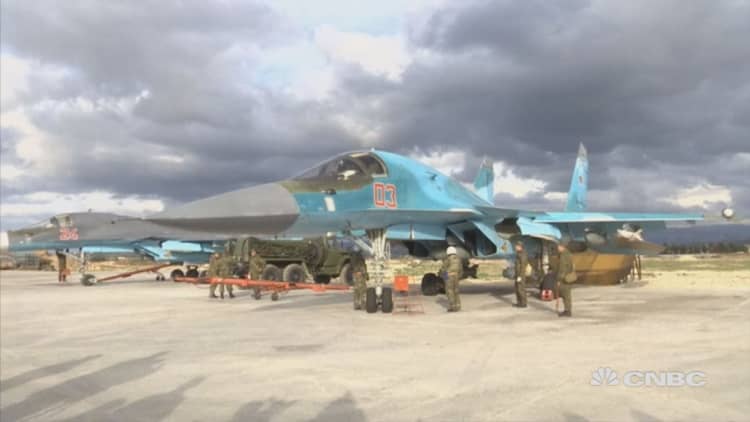
Russia has shocked the world twice in the last 24 hours – first, by announcing that it was to withdraw most of its forces from Syria and second, by appearing to implement such a move.
However many have been left scratching their heads as to why Russia and its leader, President Vladimir Putin, are suddenly appearing so co-operative.
After months of sparking protests from the West and bolstering the Syrian regime with its military action in Syria – ostensibly aimed at combating the militant group that calls itself Islamic State but mainly seen as a bid to protect President Bashar Assad – Russia announced on Monday that it was withdrawing most of its forces from the country.
Just hours after making the surprise announcement, on Tuesday morning Russia's defense ministry said the country had begun the withdrawal of military equipment from the war-torn country, News agency RIA Novosti reported. When contacted by CNBC, the ministry of defense was unable to comment on the withdrawal, however.
Later on Tuesday, Russia's deputy defense minister said that the country's air force would continue airstrikes against "terrorists in Syria," Ria Novosti reported, according to Reuters, prompting confusion over the extent of Russia's withdrawal.
Putin playing ball?
The announcement – seen as a bolt from the blue by analysts – by came as United Nations-led peace talks aimed at resolving the five-year civil war in Syria -- a complex fight between troops loyal to Assad, ISIS militants and rebel groups all vying for control of the country – resumed in Geneva.
Analysts were quick to assess not just the timing of the announcement but just why Russia, a country left out in the cold following international sanctions for its annexation of Crimea and role in a pro-Russian uprising in east Ukraine – and not winning many friends for supporting Assad militarily either -- had effectively abandoned its long-standing ally, at least in a military sense.
Cliff Kupchan, Ayham Kamel and Alexander Klimetnt from Eurasia Group said in a note late on Monday that Putin had a number of motives for making the announcement and the main factor was Russia's desire to improve its negative image on the global stage.
"First, Putin has achieved a key goal of bolstering Syrian President Bashar al-Assad and ending the discussion of his removal by force. Second, it is certainly no coincidence that Putin played this card on the very day that UN-sponsored peace talks resumed," they said.
Putin was also pressuring Assad to "meaningfully engage in talks with the goal of reaching a near-term power-sharing arrangement and longer-term constitutional reform and elections. The abrupt Russian move suggests Assad was resisting at least some of these goals," the Eurasia group said.
"Also, the Russian elite strongly wants to "come in from the cold" globally in the aftermath of the Ukraine conflict and resulting sanctions," the analysts said, with the announcement indicating that the Kremlin "seeks an improved image – particularly with its major trading partner, the EU."
Wait and see
While U.N. and Syrian opposition forces cautiously welcomed Putin's announcement on Monday, there was skepticism elsewhere. For one, the White House said it would have to wait to assess Russia's true intentions and U.S. officials said they had no advance warning of Russia's withdrawal.
Russia's military intervention in Syria has been seen as a stumbling block to peace as its forces have pounded opposition rebels rather than exclusively targeting ISIS and it could take time for trust to be restored between Russia and other global powers trying to broker a peace deal in Syria.
As such, White House Press Secretary Josh Earnest was cautious in his response to the latest announcement, saying that Russia had previously hindered the path to peace.
"We have talked about how Russia's continued military intervention to prop up the Assad regime made the efforts to reach a political transition even more difficult. That as long as Russia was aggressively weighing in militarily, they were removing at least part of the incentive for the regime to engage in those conversations."
Eurasia Group were also unsure whether the withdrawal would have any traction in the European Union, with whom Russia has a fractious relationship due to sanctions restricting trade, the analysts were wary.
"We still believe the EU is intent on renewing sector sanctions before they expire on 31 July. Today's move may affect European actions later this year or early in 2017. Finally, we don't know the extent of the withdrawal Russia will implement. The Kremlin has announced that much of the infrastructure will remain intact, including air bases at Tartus and Latakia. But we do expect a reduction of assets that will limit Russia's offensive military capabilities in Syria."
- By CNBC's Holly Ellyatt, follow her on Twitter @HollyEllyatt. Follow CNBC International on Twitter and Facebook.


